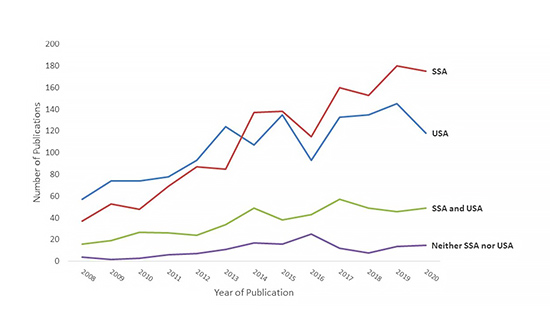Tracking equity through authorship
September / October 2022 | Volume 21 Number 5
It matters—greatly—when a published study about sub-Saharan Africa credits scientists from the region as first or last authors. Authorship not only indicates leadership in conducting and sharing research, it also is an essential part of a researcher’s career. Good news: The number and percentage of Fogarty-funded publications about the region with sub-Saharan Africa (SSA)-affiliated first and last authors increased between the years 2008 and 2020, according to a new Fogarty-authored study published in
BMJ Global Health.
 Image courtesy of Ezinne Akudinobi and Peter KilmarxThe percentage of Fogarty-funded publications about the region featuring SSA-affiliated first and/or last authors increased by over 15% between the years 2008 and 2020.
Image courtesy of Ezinne Akudinobi and Peter KilmarxThe percentage of Fogarty-funded publications about the region featuring SSA-affiliated first and/or last authors increased by over 15% between the years 2008 and 2020.
“While SSA makes up 12.5% of the global population, only 1.1% of the world’s researchers are based in the region,” wrote Fogarty co-authors Ezinne Akudinobi and Deputy Director Dr. Peter Kilmarx. In addition to the total number of publications from the region rising, the percentage of those authors with an SSA affiliation rose as well – from 45% to 63% for first authors and 28% to 46% for last.
Despite this progress, under half of the publications had SSA-affiliated last (senior) authors. And the relative citation ratio, a measure of scientific impact, was lower for papers with SSA-affiliated first and last authors compared with US-affiliated authors.
What’s needed is an investigation of impediments faced by SSA authors—language barriers, stringent authorship guidelines, and editorial bias, among them. “There is more at stake than publish or perish,” concluded Akudinobi and Kilmarx. “Ideally, African authorship will increasingly reflect Africans setting research agendas and writing about African issues for African audiences.”
The authors also encouraged other funders to conduct similar analyses to inform their initiatives and to promote equity.
More Information
Updated September 19, 2022
To view Adobe PDF files,
download current, free accessible plug-ins from Adobe's website.
Related World Regions / Countries
Related Global Health Research Topics